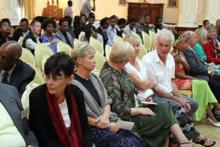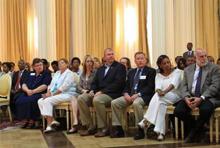Remarks by Dr Khaled Bessaoud, WHO Representative Ethiopia 21 October 2012
Your Excellency, Girma Wolde Ghiorghis , President of the Federal Democratic Republic of Ethiopia
Honorable Minister for Health, Dr Tewodros Adhanom
Respected Guests of Federal Ministry of Health - Rotary International members and partners of the polio eradication initiative
Distinguished Ladies and Gentlemen
Since the launch of Global Polio Eradication Initiative in 1988, nearly six million disabilities due to polio have been averted. Through the tremendous efforts and investments of the initiative, the number of wild polio virus cases reduced from 350,000 cases in 125 endemic countries to 650 cases in 4 endemic countries by the end of 2011; accounting for 99% reduction in global incidence of polio. In February 2012, WHO removed India from the list of countries with active endemic wild polio virus, leaving only 3 countries with current endemic wild polio virus in 2012: Nigeria, Pakistan and Afghanistan.
As of October 10th 2012, 162 wild polio virus cases have been reported globally; 60% of the reported cases are in Africa – Nigeria and Chad. Only 2 countries in Africa have reported wild polio virus cases in 2012; a significant achievement from 2011 when 14 countries recorded wild polio virus outbreaks, mostly following importations from endemic countries.
In May 2012, the World Health Assembly passed a resolution declaring Polio eradication “an emergency for global public health”. The resolution calls for increased commitment and accountability by all Member States and partners in the fight to end polio.
The last indigenous case of wild polio virus in Ethiopia was 11 years ago, however between 2004 to 2008, the country experienced five separate importations of the virus. The outbreaks were successfully interrupted and polio-free status has been maintained for more than four years to date.
WHO commends Government of Ethiopia’s commitment and efforts to achieving and maintaining polio-free status over the past four years. The recent Government efforts to intensify cross border collaborative activities are highly acknowledged. With support from key partners: Rotary, CORE GROUP, UNICEF and WHO, four cross border meetings were held in August 2012 with Somalia, Sudan, South Sudan, Kenya, Djibouti and Somalia to strengthen collaborative efforts in surveillance, routine immunization and synchronization of campaigns along the borders. It is our hope that these efforts will be closely monitored and the momentum maintained to achieve the desired results.
Though Ethiopia has remained polio free since April 2008, achieved and maintained certification level surveillance performance indicators, and achieved steady improvement in immunization coverage, the immunity and surveillance gaps at subnational level increases the country susceptibility to polio importation; particularly in the bordering regions of Somali, Afar, Benshangul Gumz and Gambella. The population immunity gaps along the neighboring border areas in countries such as Somalia, S. Sudan and Sudan due to access, security and seasonal challenges, coupled with the frequent cross border movements, pose further threats of diseases of epidemic potential such as polio.
To maintain polio free status and avert the possible risk of importation, the country has planned to conduct subnational polio supplementary immunization activities during October – November 2012 in 23 high risk bordering zones of Ethiopia, which will contribute to increasing the population immunity profile against the wild polio virus. WHO has provided technical and financial assistance for the upcoming campaigns. In addition to the regular WHO technical Field Officers; the organization has deployed an extra 16 short-term Staff throughout the target regions to strengthen the preparatory and implementation activities. Financial support has been availed through WHO for the operational costs of the campaign totaling USD 1.2 million. We applaud the local polio partnership that has supported the Government to prepare for the campaigns, notably Rotary, CORE GROUP and UNICEF, and look forward to the sustained partnership.
WHO would like to emphasize that the gains in polio eradication will not be sustained unless we strengthen routine immunization which is the main strategy to prevent our children from vaccine preventable diseases. We would therefore like to encourage partners and stakeholders present here to invest in strengthening the routine immunization system in the country. We further encourage the communities to ensure their children are fully vaccinated against polio and other target diseases according to the national immunization schedule.
The impact of this campaign will be measured by the maintained polio-free status in the country through a very sensitive surveillance system which WHO is already supporting. WHO will continue to heavily invest in the surveillance network in this country because without surveillance, it is impossible to measure the progress we are making with these interventions.
Finally, WHO would like to assure you of continued technical and financial commitment to support the Government of Ethiopia’s efforts in reducing unnecessary children suffering from vaccine preventable diseases, to achieve polio eradication.
Together, we can keep polio out of Ethiopia!
Thank you. Amessegenalhu!





